Details
- Franciska de Jong, Iulianna van der Lek, John Picard (CLARIN)
- Jennifer Edmond, Francesca Morselli (DARIAH)
About
CLARIN and DARIAH with support from ENRIITC are jointly organising an industry outreach online workshop where leading research infrastructures and networks from the social sciences and humanities are invited to exchange on past and present innovation and collaboration activities with non-academic and/or commercial partners.
The aim of the event is to identify common challenges regarding the skills needed to reach out beyond academia (e.g. more effective communication, how to translate the value of the infrastructure to non-academic and/or commercial entities etc.), as well as a set of common SSH training topics that are relevant for non-academic entities when considering the research infrastructure service offer.
Envisaged Participants
- Representatives of RIs in the SSH domain and relevant networks
- Representatives from non-academic partners (public sector and industry) who have experience collaborating with research infrastructures and/or research performing organisations.
How to Join
For more information and registration, please visit the event page.
Background
The European Union is supporting the development of a pan-European network of Industrial Liaison and Contact Officers (ILOs/ICOs) across research infrastructures (RIs) via the ENRIITC project. The main objectives of ENRIITC are:
- To establish a sustainable pan-European network of ILOs and ICOs in support of innovation collaboration with industry, resulting in the development of new technologies and products, new jobs and economic growth
- To spur greater collaboration between research infrastructures and innovating SMEs
- To develop and refine strategies and best practices to foster and facilitate such collaborations
- To raise industry awareness of collaboration opportunities with research infrastructures
- To highlight RIs’ socio-economic impact and innovation success stories.
Aims of the Event
- To raise the interest of leading SSH RIs in establishing a common collaborative initiative to help increase SSH-domain innovation cooperation with industry and non-academic institutions of private and public nature (e.g. galleries, libraries, archives, museums), starting with the launch of a joint SSH RI Industry Contact Officer Training Program based on the ENRIITC approach
- To exchange experiences about past and present innovation and collaboration activities with non-academic and/or commercial entities, and identify common challenges regarding the skills SSH RI staff need to reach out beyond academia (e.g. more effective communication, how to translate the value of the infrastructure to non-academic and/or commercial entities etc.).
Possible Outcomes
To expand the ENRIITC skills profile for Industry Contact Officers with SSH training needs, and launch an SSH pilot training scheme on common basic skills and competences needed to engage with non-academic entities and to set up innovative partnerships.
Programme
10:00 - 10:10 Introduction by Iulianna van der Lek, CLARIN; Francesca Morselli, DARIAH; John Picard, CLARIN
10:05 - 10:30 KEYNOTE: The ENRIITC Project and Its Training Recommendations for RI-Industry Contact Officers by Anne Charlotte Joubert and Marco Galeotti (ENRIITC)
10:30 - 11:30 Training 4 Innovation
Moderator: Walter Daelemans, CLiPS research centre, University of Antwerp
Short presentations (7 minutes) by representatives of SSH research infrastructures & networks on the status of SSH-domain players on innovation activities, with a focus on the skills and training needed to reach out beyond academia and set up effective partnerships.
Ordered alphabetically according to the name of the RI:
- Franciska de Jong (CLARIN)
- Jennifer Edmonds (DARIAH)
- Ivana Versic (CESSDA)
- Innovation in Language Technologies by Jan Hajic (CLARIAH-CZ, ELG)
- E-RIHS. Innovation challenges and pathways by Demetrios Anglos (E-RIHS/IESL-FORTH)
- EHRI and its non-academic partners: cooperation with benefits and challenges by Veerle Vanden Daelen, Katharina Freise & Frank Uiterwaal (EHRI)
- Europeana. How to Bring Digital Cultural Heritage Towards and Beyond Academia by Alba Irollo (EUROPEANA)
- Simon Krek (ELRC, ELEXIS)
- Suzanne Dumouchel (OPERAS)
11:30 - 11:45 Coffee Break
11:45 - 12:45 Breakout Discussions (5-6 Participants) | Moderator: Markus Pasterk
Introduction by Markus Pasterk (10 minutes)
Proposed topics for the discussions (TBC): Why is it increasingly urgent that RIs strengthen their collaboration with non-academic entities? What are the main drivers making RI innovation partnerships with European industry so important? What steps do RIs have to take individually and collectively to become truly ‘innovation-ready’ quickly, and how can ENRIITC and the ENRIITC Training Strategy help in this regard?
Topic 1 (25 minutes):
- What can RIs offer to prospective non-academic ‘clients’ and partners?
- What do non-academic entities have to gain by collaborating with RIs?
- RIs are non-profit organisations, so what is the benefit of collaborating with companies?
- Why is having an RI Business Plan so important? Why do RIs need a User Strategy?
- What skills and competencies do RI staff lack most to be able to communicate and collaborate successfully with non-scientific entities on innovation ? What focused training can best help us correct these gaps quickly?
Topic 2 (25 minutes): Identify a set of common SSH training topics that are relevant for non-academic entities when considering the research infrastructure service offer and/or the options for co-creation and innovation tracks, e.g:
For which of the following topics is training already in place? Do we have the required expertise in-house (including in our nodes)? What are we missing most?
- Science to business marketing: Conducting a successful company outcall
- Presenting scientific matters in a way sure to interest private sector interlocutors
- How to handle typical data types that SSH RIs have on offer (text formats, audiovisual formats, survey data etc.)
- RI data policy and management practices affecting innovation-collaboration relationships
- Issues related to standards (for data annotation, model training etc.)
- Access issues: Privacy, ethics and gender bias; GDPR and handling of sensitive data
- IPR issues, copyright, patents, licensing etc.
- Drafting and negotiating of Non-Disclosure Agreements (NDA), Confidentiality Agreements, Collaboration Agreements, etc.
12:45 - 13:15 Lunch Break
13:15 - 13:45 Reporting, Wrap-Up and Next Steps
Note: If needed, the event can be extended until 14:00.
Reading Materials (Optional)
- ENRIITC Report on the Mapping of Industry as RI-supplier and RI-user (link)
- ENRIITC Strategy for training of ILOs/ICOs and outreach towards industry (link)
- Outcomes of the preparatory survey among participants (before the event)
Abstracts & Bios
Keynotes

Anne-Charlotte Joubert, ESS-
The ENRIITC Project and Its Training Recommendations for RI-Industry Contact Officers
BIO: Anne-Charlotte Joubert is a European funding expert with extensive knowledge of the European landscape. With over ten years of experience, she has spent most of her career in Brussels as a consultant supporting public and private organisations of all sizes, where she identified, accessed and secured funding for the development of their businesses. Since 2017, she has been a Grant Officer at the European Spallation Source ERIC in Sweden and the coordinator of the EU-funded project ENRIITC.
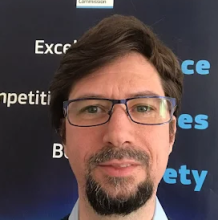
Marco Galeotti, EMSO-ERIC
The ENRIITC Project and Its Training Recommendations for RI-Industry Contact Officers
BIO: Marco Galeotti is the Industry Contact Officer and Communication Officer at EMSO ERIC (European Multidisciplinary Seafloor and water-column Observatory). He holds an MSc in Theoretical Physics and a postgraduate degree in Communication, Laws and Economy of Science. He is a certified Project Manager with more than twenty years of experience in managing ICT and EU funded projects.
In particular, in the H2020 project ENRIITC Marco has been one of the authors of the strategies to exploit the innovation potential of RIs, and to train ICOs and ILOs.
Previously, Marco worked for the National Research Council of Italy as a Technologist and as ICT and Reporting Officer in the European Research Infrastructure for Heritage Science (ERIHS). During that experience, he developed the data model of the ERIHS Catalogue of Services.
In 2018, with a mandate of the European Commission, as SSH Integration expert, he carried out the quantitative data analysis for the ‘4th monitoring report on SSH flagged projects funded in 2017 under the Societal Challenges and Industrial Leadership priorities’ of the data for societal challenges (SCs) and Industrial Leadership LEITs.
Marco has also been a member of the Project Management Board of the NET4SOCIETY European network of SC6 NCPs.
Training 4 Innovation
Chair of the Session

Walter Daelemans, CLiPS research centre, University of Antwerp
BIO: Walter Daelemans is professor of Artificial Intelligence and Natural Language Processing ( ) at the University of Antwerp. He was part of the statistical and machine learning revolution in NLP in the nineties with the development of Memory-Based Language Processing and with work on the methodology of machine learning for language processing. He was awarded EurAI and ACL fellowships for this work, and has published on text mining and knowledge extraction from biomedical, clinical, and social media text, on stylometry and author profiling, and on conversational agents. He has been involved in the creation of popular open-source software such as TiMBL, Frog and Pattern, and has co-founded two NLPl spin-offs (textkernel and textgain).
Speakers
- Franciska de Jong, CLARIN (bio below)
- Jennifer Edmond, DARIAH
- Ivana Versic, CESSDA
- Jan Hajic, CLARIAH-CZ (abstract and bio below)
- Demetrios Anglos, E-RIHS (abstract and bio below)
- Veerle Vanden Daelen, EHRI (abstract and bio below)
- Frank Uiterwaal, EHRI (abstract and bio below)
- Alba Irollo, Europeana (abstract and bio below)
- Suzanne Dumouchel, OPERAS
- Simon Krek, Jožef Stefan Institute, Ljubljana (abstract and bio below)
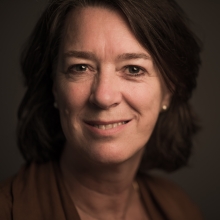
Franciska de Jong, CLARIN
Franciska studied Dutch language and literature at Utrecht University, did a PhD track in theoretical linguistics and made the switch to language technology in 1985 when she started working on machine translation at Philips Research. She has been professor of language technology at the Universiteit Twente (UT) since 1992, and is director of the Erasmus Studio for e-research at the Erasmus Universiteit Rotterdam (EUR) where she also holds a chair in e-research for the social sciences and the humanities.
Currently her main research interests are in multimedia indexing, spoken document retrieval, text mining, access technology for digital libraries, interview archives and cultural heritage collections, and e-research in general. She is frequently involved in international programme committees, expert groups and review panels, and has initiated a number of projects funded within the EU framework programmes. From 2008-2016 she was vice-president of the governing board of the Netherlands Organisation for Scientific Research (NWO). Currently she is a member of the NWO Permanent Committee for Large-Scale Scientific Infrastructure (since 2018) and the executive board of ERIC Forum (since 2020). A detailed profile can be found here.
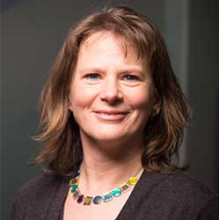
Jennifer Edmond, DARIAH
PRESENTATION ABSTRACT

The LINDAT/CLARIAH-CZ research infrastructure, on top of collecting, processing, annotating, curating, preserving and distributing data in digital humanities and arts, develops language technology applications, based (not only) on the language resources it covers and on various machine learning technologies. This includes basic language analysis (morphology, lemmatization, tokenization, segmentation, dependency parsing) in 100+ languages, machine translation among about 10 languages in all directions, named entity recognition, writing tools, etc. All these tools are also available as web services and through an UI, and used by both the research community, the public, as well as the industry. While still at its beginnings, the industrial (and public administration) use is rising, and we and our partners are learning new skills for organising technology transfer and service use in the triangle connecting the RI, the University and the users.
BIO: Jan Hajic is a full professor of Computational Linguistics and the deputy head of the Institute of Formal and Applied Linguistics at the School of Computer Science, Charles University in Prague, where he has also received his Ph.D. in 1995. His interests cover morphology and part-of-speech tagging of inflective languages, machine translation, lexical issues, knowledge representation and deep language understanding. He has an extensive experience in building language resources for multiple languages with rich linguistic annotation, and he is currently the main coordinator and director of the LINDAT/CLARIAH-CZ research infrastructure, part of the CLARIN and DARIAH networks. His work experience includes both industrial research (IBM Research Yorktown Heights, NY, USA, in 1991-1993) and academia (Charles University in Prague, Czech Republic and Johns Hopkins University, Baltimore, MD, USA – visiting 1999-2000, University of Colorado Boulder - current Adjunct Professor position). He has published more than 200 conference and journal papers, a book on computational morphology, and several other book chapters, encyclopaedia and handbook entries. He regularly teaches basic and advanced courses on Statistical NLP and has multiple experience giving tutorials and lectures at various international training schools. He has been the PI or Co-PI of numerous international (EU, U.S.) as well as large national grants and projects.
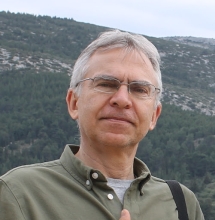
Demetrios Anglos, E-RIHS
PRESENTATION ABSTRACT: E-RIHS. Innovation Challenges and Pathways. An innovative concept in itself, E-RIHS (the European Research Infrastructure for Heritage Science, http://www.e-rihs.eu/) offers access to large and medium-scale analytical facilities (FIXLAB), to an impressive array of advanced mobile analytical instrumentation (MOLAB), as well as to invaluable scientific datasets archived in knowledge repositories of prestigious European museums, galleries and research institutions (ARCHLAB). A major ambition of E-RIHS is to promote a culture of innovation all across the spectrum of its research activities, in the access services provided, through its unique training activities and even at the management level, exploring new models for maximising the impact of HS research on scientific knowledge, technological know-how and socio-economic growth based on the sustainable use of cultural heritage. Further to the above, a major challenge concerns collaborations with the non-academic sector and how to ensure meaningful and productive interactions.
BIO: Demetrios Anglos is Professor at the Department of Chemistry, University of Crete and Associated Researcher at IESL-FORTH, where he leads the Applied Spectroscopy Laboratory. He holds a BSc in Chemistry (1986) from the University of Athens, Greece, and a PhD in Physical Chemistry (1994) from Cornell University, USA. The activities of his research group focus on the applications of laser spectroscopic techniques in the analysis of materials coupled to the development of mobile, field-deployable instrumentation with diagnostic potential in heritage science. Over the past few years he has concentrated his attention on European and national initiatives which aim to develop Research Infrastructures relevant to Cultural Heritage Science, E-RIHS (European Research Infrastructure for Heritage Science) and E-RIHS.gr.
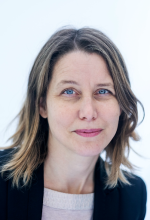
Veerle Vanden Daelen, EHRI
PRESENTATION ABSTRACT: Since starting on the identification and integration work for the European Holocaust Research Infrastructure in April 2011, building the EHRI-Portal on Holocaust-related sources, Veerle has been in touch with various institutions and people across the world. The EHRI Portal does not only provide information about Holocaust-related sources in national archives, but also across a wide range of small and larger archival organisations, museums and memorial institutions. This contribution will shed light on the experiences EHRI has had reaching out to non-academic small and medium-sized institutions as well as micro-archives and the specific challenges and needs the RI project has had to take into account when doing so. How can such encounters lead to benefits for both the organisations and the Research Infrastructure?
BIO: Veerle Vanden Daelen is deputy general director and director collections and research at Kazerne Dossin: Memorial, Museum and Research Centre on Holocaust and Human Rights. She holds a PhD from the University of Antwerp. Her doctoral research focused on the return of Jews and the reconstruction of their life in Antwerp after the Second World War (1944-1960). Veerle is the coordinator of the ‘Data Identification and Integration’ work package for the European Holocaust Research Infrastructure (project EHRI). She is affiliated with the University of Antwerp, where she organises the annual ‘Contact Day Jewish Studies on the Low Countries’ at the Institute of Jewish Studies. Veerle is also a member of the Belgian delegation to the International Holocaust Remembrance Alliance (IHRA).
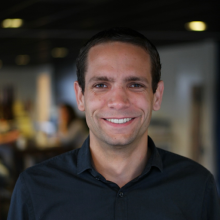
Frank Uiterwaal MA, EHRI
BIO: Frank Uiterwaal is an Information Analyst at the Collections & Services department at the NIOD-KNAW. Within the European Holocaust Research Infrastructure (EHRI), he is also active in the Preparatory Phase project (EHRI-PP) as the coordinator of the work package on finance. Moreover, Frank contributes to various other work packages in EHRI-PP and in the parallel Integrating Activities project EHRI-3, focusing on governance, impact, innovation and sustainability.
By background, Frank holds an MA in both Cultural History and in Cultural Heritage. During his studies, Frank has already been working on digital portals for the Centre for International Heritage Activities and the Royal Netherlands Institute in Rome. In his role as an Information Analyst at the NIOD-KNAW, he combines his understanding of historical research methods with knowledge and skills in IT project and service management.
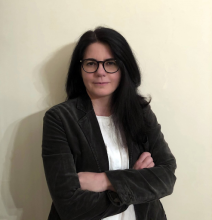
Alba Irollo, Europeana
PRESENTATION
Europeana. How to Bring Digital Cultural Heritage Towards and Beyond Academia
BIO: Alba Irollo is in charge of Europeana Research at the Europeana Foundation (EF), The Hague, which oversees Europeana, the European Commission’s initiative for Digital Cultural Heritage. Europeana Research’s area embraces the interconnections between digital cultural heritage and digital humanities. Before joining the EF, she gained experience in the field of cultural policy at the European Commission in Brussels. Inter alia, she worked on the preparatory phase of the European Year of Cultural Heritage (2018). She holds a PhD in History of Art and, besides engaging with cultural policy, conducts research in the field of heritage and museum studies.
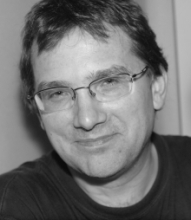
Simon Krek, Jožef Stefan Institute, Ljubljana
PRESENTATION ABSTRACT: The European Lexicographic Infrastructure (ELEXIS) project aims to harmonise the efforts of European institutions, publishers, universities and communities creating dictionaries and/or dictionary data, and develop tools and services that will reduce the cost and time needed to update existing or compile new lexicographic resources. The results will also help everyone work towards the same standards and increase the quality.
The ELEXIS Curriculum is an integrated set of training materials which contextualises ELEXIS tools and services inside a broader, systematic pedagogic narrative. This means that the goal of the ELEXIS Curriculum is not simply to inform users about the functionalities of particular tools and services developed within the project, but to show how such tools and services are a) embedded in both lexicographic theory and practice, and b) representative of and contributing to the development of digital skills among lexicographers.
BIO: Simon Krek (https://www.simonkrek.si/en) is a researcher in the Artificial Intelligence Laboratory at the Jožef Stefan Institute in Ljubljana, Slovenia, and the head of the Centre for Language Resources and Technologies at the University of Ljubljana. His research fields are lexicography and lexicogrammar, corpus linguistics, natural language processing (for Slovene), language technology infrastructure (for Slovene) and computer-aided language learning and teaching.
He started his career as the Editor-in-Chief of the English-Slovene Dictionary, a project which also produced the first representative corpus of Slovene. From 2008-2013, he coordinated a major Slovene Language Technology project, which produced extensive language resources and tools for the Slovene language: written corpora, spoken corpus, web concordancers, natural language processing tools, lexicons, lexical databases etc. From 2008 he has participated in several European projects (META-NET, X-LIKE, AQUASMART etc.) and is currently leading the H2020-funded ELEXIS project (European Lexicographic Infrastructure – 2018-2022). He is also National Anchor Point in the ELRC project (European Language Resources Coordination) and has a role as the deputy national coordinator of the CLARIN.SI infrastructure, as part of the European CLARIN.EU infrastructure.
Breakout Discussions
Moderator
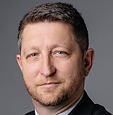
Markus Pasterk, X-officio, Senior Advisor at University of Milan-Bicocca, Visiting Prof. and contractor
BIO: Markus Pasterk is a molecular biologist by training and served as an executive in national and international organisations. He held the positions of a Scientific Coordinator at IARC/WHO (Lyon, France), Director General at the Austrian Science Ministry and COO/VP at the International Prevention Research Institute. He specialises in the management of European research infrastructures, from business planning to strategy implementation, governance and operations. Since 2017, he is a visiting professor for management at the 'Executive Masters in Management of Research Infrastructures' (University of Milano-Bicocca) and prior to that he was a senior lecturer at Dundee University. He was project coordinator of the H2020 RItrain project as well as WP leader in several other EU projects. In addition, he was the coordinator of the successful proposal ‘ERIC Forum Implementation Project’, while working for BBMRI-ERIC.
Organisers
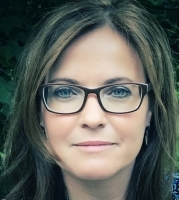
Iulianna van der Lek, Training and Education Officer, CLARIN ERIC.
BIO: Iulianna van der Lek is Training and Education Officer at CLARIN ERIC, in this role, she is working closely with the CLARIN community to ensure that the training and resource activities relevant to the humanities and social sciences disciplines are developed according to the FAIR principles for scientific data management. In addition, she is coordinating CLARIN's activities in the UPSKILLS project, an ERASMUS+ initiative that aims at upgrading the skills of Linguistics and Language Students.
In the past, Iulianna worked as a terminologist, technical writer and lecturer in Computer-Aided Translation and Terminology Management. Besides teaching, she has experience in optimising and developing training programs for both students and professional translators. Finally, Iulianna has been involved in community projects, such as the development of the Language Technology Wiki, Translation Commons and is a member of the JIAMCATT Liaison Committee at the European Commission.
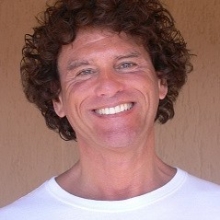
John Picard, Senior Advisor, Innovation & Industry, CLARIN ERIC